初中英语单词构词法——后缀
- 格式:doc
- 大小:19.00 KB
- 文档页数:2

英语单词构词法一般读者对我国汉字的构造法都有所了解。
汉字属于拼形文字。
英语科技术语的构词法也有类似的道理。
所不同的在于:它们是拼音文字,不是由偏旁构成的,而是由若干个(通常是一,两个或三,四个词素(word elements)构成的。
所谓―词素‖,是指构成一个词的各个基本组成单位,它是由若干个音节构成的。
各个词素都有其语言上一定的来源。
例如:prewar postwar Interwar战前战后(两次战争之间)拆字Pre + war Post + war Inter + war词源(拉)(条顿语)(拉)(条顿语)(拉)(条顿语)Prae war Post war Inter war(before) (after) (between)前战争后战争之间战争上面这三个词:prewar, postwar, interwar拆出来的pre, post, inter, war都是词素。
这里面的―war‖,叫做词根(root)。
由于―war‖这个词根是从条顿语(Teutonic)演变而来的,所以也称为条顿词根(Teutonic root)。
同样地,如果一个词根是从拉丁语或希腊语来的。
便称为拉丁词根(Latin root)或希腊词根(Greek root)。
凡是词根,都有其本身的含义。
例如这个war字,其本身的含义是―战争‖。
上面那些pre-, post-, inter-, 叫做前缀(prefix),是放到词根的前面,和词根结合起来构成一个派生词。
除了前缀外,还有后缀(suffix)。
它是放在词根的后面,一般是起着词性变化的作用。
例如:industrial industrialize Industrialization工业的工业化工业化(名词)拆字:Industry +al Industry + al+izeIndustry + al + iz +tion工业的化上面这些-al, -ize, -tion都是后缀,放在词根的后面起词性变化的作用。
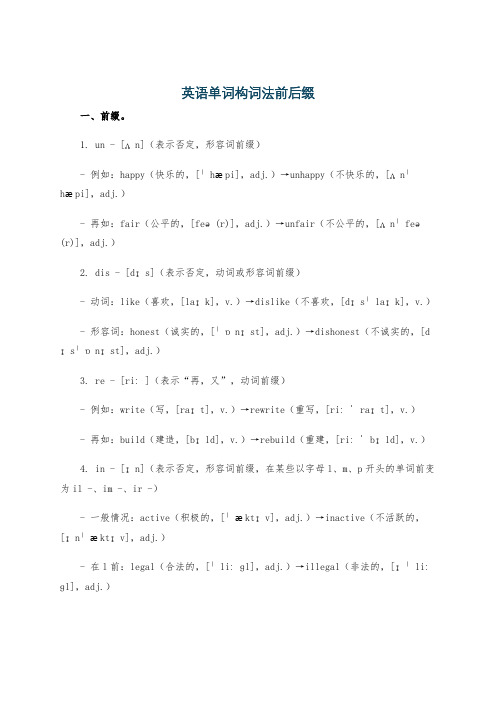
英语单词构词法前后缀一、前缀。
1. un - [ʌn](表示否定,形容词前缀)- 例如:happy(快乐的,[ˈhæpi],adj.)→unhappy(不快乐的,[ʌnˈhæpi],adj.)- 再如:fair(公平的,[feə(r)],adj.)→unfair(不公平的,[ʌnˈfeə(r)],adj.)2. dis - [dɪs](表示否定,动词或形容词前缀)- 动词:like(喜欢,[laɪk],v.)→dislike(不喜欢,[dɪsˈlaɪk],v.)- 形容词:honest(诚实的,[ˈɒnɪst],adj.)→dishonest(不诚实的,[d ɪsˈɒnɪst],adj.)3. re - [riː](表示“再,又”,动词前缀)- 例如:write(写,[raɪt],v.)→rewrite(重写,[riːˈraɪt],v.)- 再如:build(建造,[bɪld],v.)→rebuild(重建,[riːˈbɪld],v.)4. in - [ɪn](表示否定,形容词前缀,在某些以字母l、m、p开头的单词前变为il -、im -、ir -)- 一般情况:active(积极的,[ˈæktɪv],adj.)→inactive(不活跃的,[ɪnˈæktɪv],adj.)- 在l前:legal(合法的,[ˈliːɡl],adj.)→illegal(非法的,[ɪˈliːɡl],adj.)- 在m前:moral(道德的,[ˈmɒrəl],adj.)→immoral(不道德的,[ɪˈm ɒrəl],adj.)- 在r前:regular(规则的,[ˈreɡjələ(r)],adj.)→irregular(不规则的,[ɪˈreɡjələ(r)],adj.)5. pre - [priː](表示“在……之前”,形容词或动词前缀)- 形容词:school(学校,[skuːl])→preschool(学前的,[ˈpriːskuːl],adj.)- 动词:pay(支付,[peɪ],v.)→prepay(预付,[priːˈpeɪ],v.)6. post - [pəʊst](表示“在……之后”,形容词或名词前缀)- 形容词:war(战争,[wɔː(r)])→post - war(战后的,[ˈpəʊst wɔː(r)],adj.)- 名词:graduate(毕业生,[ˈɡrædʒuət])→postgraduate(研究生,[ˌp əʊstˈɡrædʒuət],n.)二、后缀。
![[全]初中英语全部前缀+后缀的记忆及运用](https://img.taocdn.com/s1/m/3b4bceb2f46527d3250ce06a.png)
初中英语全部前缀+后缀的记忆及运用-人教大凡英语学习者,都会觉得单词难记。
因此很多英语学习先行者总结出不少行之有效的记忆单词方法,其中一种方法就是利用构词法记单词。
利用构词法记单词确实是一种很有效的方法,符合英语词汇的构成规律。
常见的构词法有三种,其中一种叫派生法。
所谓派生法,就是在词的前面加上前缀或在词的后面加上后缀构成另一个词的方法。
本文针对初中所学的前缀后缀,进行归类,来个大汇总,方便初中生尤其是即将参加中考的学子们记忆,并且通过例句讲解,帮助大家掌握这些词的用法。
这是本文区别于其它很多同类文章所不同的地方,严格从考纲出发,所列举的词100%是初中所学,是中考考纲所要求掌握的,希望我的付出可以帮到更多的同学。
一、前缀的作用及所学的前缀前缀用在词根前面以改变词的意义,一般不改变词性。
初中所学的前缀有:一)否定前缀1.un- :unhappy,unusual,unfair,unlike,unfriendly,uncomfortable,uncrowded,uneasy,unexpecte d,unlucky,unbelievable,unable,unforgettable。
2. im-:impolite,impossible。
3. in-:inexpensive,incorrect,informal。
4. dis-:dislike,disappointed,discover,discourage,dishonest,disappear,disbelief,disadvantage,disabled。
5. ir-:irregular。
二)其它前缀1. re-(表示再,又):review,recycle,return,reuse,reusable,research。
2. inter-(表示在。
之间,相互):interview,internet,international。
3. under-(表示低于):underwear,underground。

英语前缀后缀
前缀和后缀是构成单词的组成部分,它们分别位于词根的前面和后面。
它们可以改变单词的含义或语法特性。
以下是前缀和后缀的解释:前缀(Prefix):前缀是附加在词根前面的字母或字母组合,用于改变原词的含义。
例如,在单词unhappy中,un-就是一个前缀,表示否定,将happy的含义变为不快乐。
常见的前缀有:
un-表示否定或相反。
re-表示再次或重新。
pre-表示在前面或在之前。
dis-表示否定或相反。
后缀(Suffix):后缀是附加在词根后面的字母或字母组合,用于改变单词的语法特性或词性。
例如,在单词happiness中,-ness 就是一个后缀,将happy变为happiness,表示状态或性质。
常见的后缀有:
-er表示某人或某物的人或物。
-ing表示进行中或现在进行时。
-ed表示过去时或完成时。
-ly表示以某种方式。
前缀和后缀的使用使得我们可以通过组合不同的元素来形成新的单词,并理解它们的含义和用法。

初中英语单词词根词缀记忆法大全常用的前缀主要有:ab 表示反常如:absent 缺席 abnormal 不正规的ap 表示添加如:append 悬挂 apposition 同位置bi 表示两、重如:bicycle 自行车 bigamy 重婚com 表示共同如:combine 联合 compete 相争dis 表示分开如:disarm 裁军 dislike 讨厌im 表示不如: impossible不可能的 immoral 不道德的in 表示不、向内如:informal 非正式的 inhuman 不人道的non 表示无如:nonparty 无党派的 nonmetal 非金属pro 表示向前如:progress 进步 prognostic 预兆re 表示回、重新如: review 复习 reaction 反应un 表示不、非如:unhappy 不快乐的 unbalance 失去平衡常用的后缀主要有:al 表示人、物如:rival 竞争者 mural 壁画cy 表示状态、职位如:bankruptcy 破产 captaincy 船长er 表示人、物如:teacher 老师 cooker 厨具able 表示可能的如: movable 可移动的 passable 可通行的ful 表示充满如: beautiful 美丽的 useful 有用的or 表示人、物如:actor 男演员 mirror 镜子ist 表示人如:copyist 抄写员 socialist 社会主义者ment 表示行为如:enjoyment 娱乐 movement 运动ing 表示令人如:exciting 令人兴奋的 interesting 令人有兴趣的ed 表示感到如:excited 感到兴奋的 interested 感到有兴趣的less 表示没有的如: resistless 不抵抗的 homeless 无家可归的ly 副词后缀如:gently 轻轻地 intently 专心地tion 名词后缀如:graduation 毕业 relation 亲属典型的前后缀应用举例:1 excite vt.刺激 exciting adj. 令人兴奋的 excited adj.感到兴奋的 excitement n.兴奋2 smile v./n.微笑 smiling adj. 微笑的 smilingly adv.微笑的 unsmiling adj.不笑的自学小贴士:词根词缀记忆法常常被英语初学者所忽略,如果将此法配合多遍反复记法在自学中应用则能够做到举一至少反三的妙用。

英语四个构词法(最新版)目录1.英语构词法的概述2.英语构词法的分类3.构词法的具体用法和例子4.学习构词法的重要性5.总结正文英语四个构词法英语构词法指的是英语单词是如何通过不同的方式组成新单词的。
英语单词的构成方式有很多种,但最常见的构词法主要包括以下四种:前缀法、后缀法、词根法和复合法。
1.前缀法前缀法指的是在单词前面加上一个前缀来构成新单词。
前缀可以是单词、字母或者符号,它们通常用于改变单词的意思。
例如,单词“happy”(快乐) 加上前缀“un”(不),就可以构成新单词“unhappy”(不快乐)。
2.后缀法后缀法指的是在单词后面加上一个后缀来构成新单词。
后缀也可以是单词、字母或者符号,它们通常用于改变单词的词性。
例如,单词“happy”(快乐) 加上后缀“-ness”(名词后缀),就可以构成新单词“happiness”(快乐)。
3.词根法词根法指的是通过将单词分解成词根来构成新单词。
词根是单词的基本部分,通常是一个或多个字母。
例如,单词“correct”(正确) 可以分解成词根“cor”(共同) 和“rect”(直),然后通过加上后缀“-ly”(副词后缀) 来构成新单词“correctly”(正确地)。
4.复合法复合法指的是将两个或多个单词组合在一起来构成新单词。
例如,单词“book”(书) 和“shop”(商店) 可以组合在一起构成新单词“bookshop”(书店)。
学习构词法对于学习英语非常重要。
它可以帮助我们更好地理解单词的意思和用法,并且可以帮助我们更容易地记住单词。
通过学习构词法,我们可以更好地掌握英语单词,提高我们的英语水平。
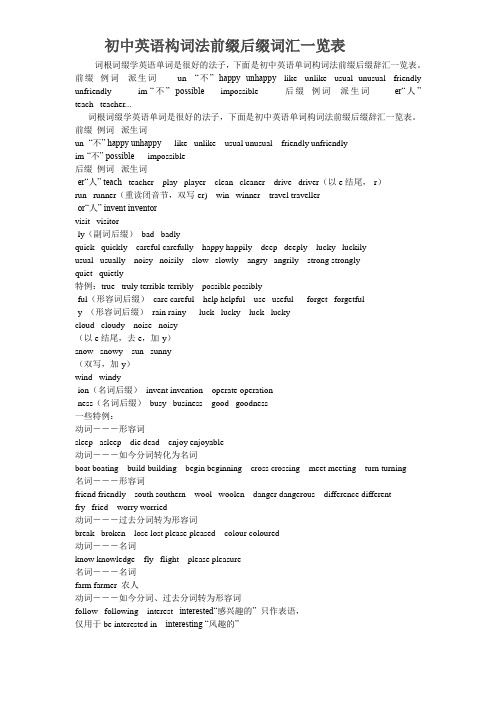
初中英语构词法前缀后缀词汇一览表词根词缀学英语单词是很好的法子,下面是初中英语单词构词法前缀后缀辞汇一览表。
前缀例词派生词un- “不” happy unhappy like unlike usual unusual friendly unfriendly im-“不” possible impossible 后缀例词派生词-er“人” teach teacher...词根词缀学英语单词是很好的法子,下面是初中英语单词构词法前缀后缀辞汇一览表。
前缀例词派生词un- “不” happy unhappy like unlike usual unusual friendly unfriendlyim-“不” possible impossible后缀例词派生词-er“人” teach teacher play player clean cleaner drive driver(以e结尾,-r)run runner(重读闭音节,双写-er) win winner travel traveller-or“人” invent inventorvisit visitor-ly(副词后缀)bad badlyquick quickly careful carefully happy happily deep deeply lucky luckilyusual usually noisy noisily slow slowly angry angrily strong stronglyquiet quietly特例:true truly terrible terribly possible possibly-ful(形容词后缀)care careful help helpful use useful forget forgetful-y (形容词后缀)rain rainy luck lucky luck luckycloud cloudy noise noisy(以e结尾,去e,加-y)snow snowy sun sunny(双写,加-y)wind windy-ion(名词后缀)invent invention operate operation-ness(名词后缀)busy business good goodness一些特例:动词---形容词sleep asleep die dead enjoy enjoyable动词---如今分词转化为名词boat boating build building begin beginning cross crossing meet meeting turn turning名词---形容词friend friendly south southern wool woolen danger dangerous difference differentfry fried worry worried动词---过去分词转为形容词break broken lose lost please pleased colour coloured动词---名词know knowledge fly flight please pleasure名词---名词farm farmer 农人动词---如今分词、过去分词转为形容词follow following interest interested“感兴趣的” 只作表语,仅用于be interested in interesting “风趣的”可作表语和定语develop developed “蓬勃的”developing “发展中的”词根词缀学英语单词是很好的方法,下面是初中英语单词构词法前缀后缀词汇一览表。
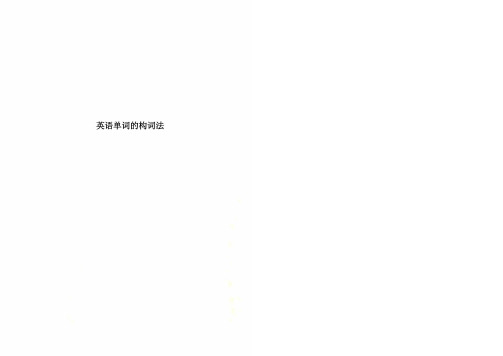
英语单词的构词法英语单词的构成主要有派生、合成和转换三种。
派生分——前缀、后缀。
一、派生前缀——在词首添加固定字母组合,通常改变词义,不改变原词性。
如:动词否定前缀:dis——discover发现形容词、副词否定前缀:un,im,in——unhappy不高兴,impossible不可能动词的重复前缀:re——redo重做,recite背诵,record记录名词的遥远前缀:tele (多用于电信)——television,telescope望远镜,telegraph电报后缀——在词尾添加固定字母组合,通常改变词性,不改变原基本词义。
如:形容词后缀ful(基本词full)表示充满了什么——colorful天气后缀y——windy,sunny注意:少数后缀既改词义又改词性。
如:less为否定后缀(基本词为little的比较级)——homeless(无家)前缀构词法一览表后缀构词法一览表副词、数词、动词后缀1、词形变化最活跃的词——名词、形容词。
2、名词可以变形容词,形容词可以变副词,但名词不能直接变为副词,必须通过形容词过渡。
如:luck(名词)——lucky(形容词)——luckily(副词)care(名词)——careless(粗心的)——carelessly(粗心地)ly通常是副词的标志词尾,但少数名词+ly结尾的却是形容词。
如:friendly友好的,友谊的 lovely 可爱的,有趣的lively活泼的,活跃的 *lonely孤独的,独立的(alone孤独地,副词)二、合成合成构词法三、转换转换构词法四、缩略词五、轻松单词的识记办法——“团记”。
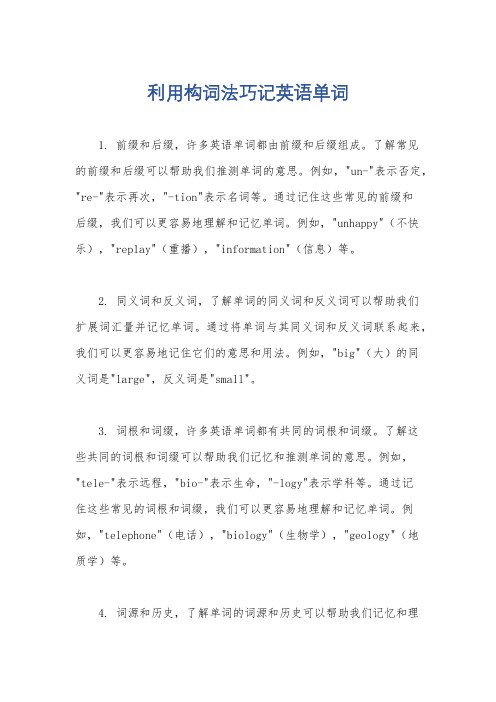
利用构词法巧记英语单词1. 前缀和后缀,许多英语单词都由前缀和后缀组成。
了解常见的前缀和后缀可以帮助我们推测单词的意思。
例如,"un-"表示否定,"re-"表示再次,"-tion"表示名词等。
通过记住这些常见的前缀和后缀,我们可以更容易地理解和记忆单词。
例如,"unhappy"(不快乐),"replay"(重播),"information"(信息)等。
2. 同义词和反义词,了解单词的同义词和反义词可以帮助我们扩展词汇量并记忆单词。
通过将单词与其同义词和反义词联系起来,我们可以更容易地记住它们的意思和用法。
例如,"big"(大)的同义词是"large",反义词是"small"。
3. 词根和词缀,许多英语单词都有共同的词根和词缀。
了解这些共同的词根和词缀可以帮助我们记忆和推测单词的意思。
例如,"tele-"表示远程,"bio-"表示生命,"-logy"表示学科等。
通过记住这些常见的词根和词缀,我们可以更容易地理解和记忆单词。
例如,"telephone"(电话),"biology"(生物学),"geology"(地质学)等。
4. 词源和历史,了解单词的词源和历史可以帮助我们记忆和理解它们的意思和用法。
通过了解单词的起源和演变过程,我们可以更容易地记住它们的含义。
例如,"vocabulary"(词汇)源自拉丁语的"vocabulum",意为"名称"。
了解这一词源可以帮助我们记忆和理解这个单词。
5. 词语搭配和用法,了解单词的常见搭配和用法可以帮助我们记忆和应用它们。

英语单词构词法一、派生法派生是通过加前缀和后缀构成新词。
词性转换主要是四大类实词(名词、形容词、动词、副词)之间的转换。
1)名词后缀:表示人:-ee: employee-er: farmer-ist: artist-or: actor表示抽象名词:-ment: development-tion: invitation action-sion: decision2)形容词词缀:前缀:un-: unhappyin-: informaldis-: dislike后缀:-y: healthy funny-less: careless hopeless-ous: dangerous3)动词词缀:前缀:en-: ensure enlarge后缀:-ly: really happily-ward: backward homeward-wise: otherwise二、合成法合成法是指由两个或更多的词合成一个复合词,他们当中有的用连字符号“-”链接,有的直接写在一起,还有的由分开的两个词构成。
复合词包括复合名词、复合形容词、复合动词等。
1)复合名词:well-being pickpocket go-betweenhotline reading-room silkworm2)复合形容词:peace-loving hard-working good-lookingwell-known light-green white-collar3)复合动词:sleep-walk undergo white-wash三、转化法转化法是指由一种词性转化为另一种或几种词性的方法。
1)名词转化为动词book书()------预订()chair椅子()----主持()head()-----()arm()-----()bag()-----()hand()-----()nurse()-----()man()-----()2)形容词转化为名词slow()-----()warm()-----()dry()-----()clean()-----()better()-----()3)动词转化为名词catch()-----()find()-----()make()-----()do()-----()smoke()-----()。
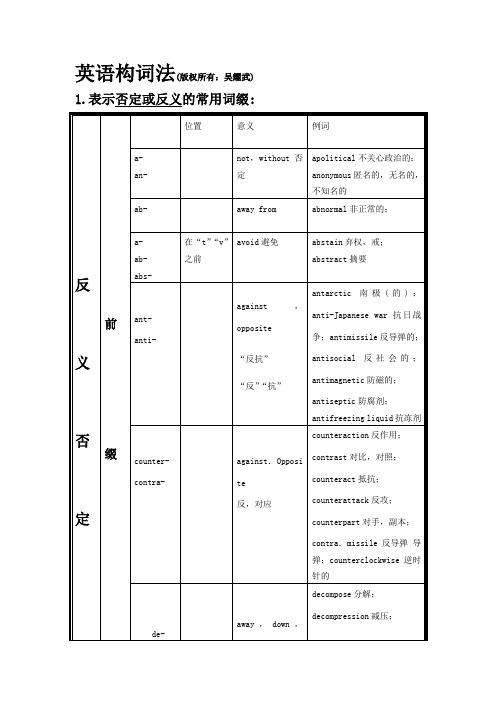

初中英语构词法有哪些?初中英语构词法有哪些?掌握单词的构词法规律对学生学习英语大有裨益。
(一)常用前缀:1.形容词前加“un-”、“il-”、“im-”、“in”或“ir”,表示相反的意思。
如:happy(高兴)-unhappy(不高兴),lucky(幸运)--unlucky(不幸),able(能)--unable(不能),countable(可数的)—uncountable(不可数的)possible(可能的)--impossible(不可能的);fair(公平)--unfair(不公平),like(像)--unlike(不像);legal(合法的)--illegal (不合法的),logical(合符逻辑的)--illogical(不合符逻辑的);direct(直接的)--indirect (间接的)moveable(可移动的)--immovable(不可移动的),complete(完全的)--incomplete (不完全的),dependent(需要依靠的)--independent(独立的);regular(规则的)--irregular (不规则的),removable(可移动的)--irremovable(不可移动的)。
2.动词前加“dis-”表示相反的意思。
如:like--dislike,cover--discover,agree--disagree。
3.动词前加“mis-”表示“弄错”的意思。
如:count--miscount,take--mistake,hear--mishear。
4.动词前加“re-”表示“重做”的意思。
如:write--rewrite,tell--retell,open--reopen,call--recall,build--rebuild。
5.名词前加“tele-”表示“远距离”的意思。
如:phone--telephone,vision--television,scope--telescope。
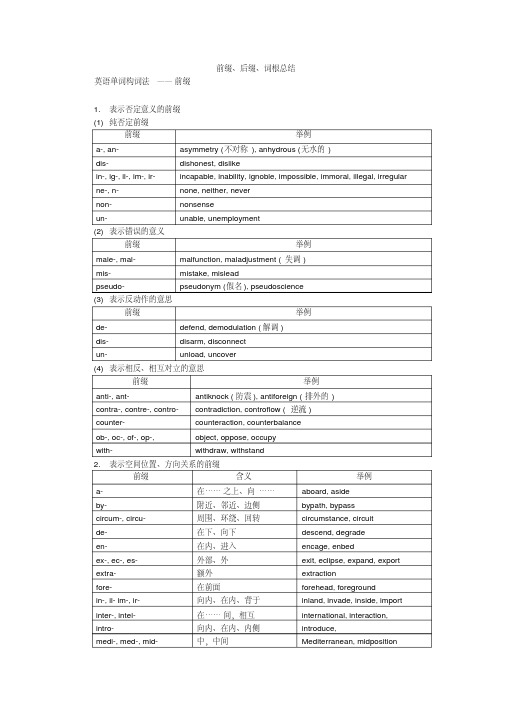
前缀、后缀、词根总结英语单词构词法——前缀1.表示否定意义的前缀(1)纯否定前缀前缀举例a-, an- asymmetry (不对称), anhydrous (无水的)dis- dishonest, dislikein-, ig-, il-, im-, ir- incapable, inability, ignoble, impossible, immoral, illegal, irregular ne-, n- none, neither, nevernon- nonsenseun- unable, unemployment(2) 表示错误的意义前缀举例male-, mal- malfunction, maladjustment (失调)mis- mistake, misleadpseudo- pseudonym (假名), pseudoscience(3) 表示反动作的意思前缀举例de- defend, demodulation (解调)dis- disarm, disconnectun- unload, uncover(4) 表示相反、相互对立的意思前缀举例anti-, ant- antiknock (防震), antiforeign (排外的)contra-, contre-, contro- contradiction, controflow (逆流)counter- counteraction, counterbalanceob-, oc-, of-, op-, object, oppose, occupywith- withdraw, withstand2.表示空间位置、方向关系的前缀前缀含义举例a- 在……之上、向……aboard, asideby- 附近、邻近、边侧bypath, bypasscircum-, circu- 周围、环绕、回转circumstance, circuitde- 在下、向下descend, degradeen- 在内、进入encage, enbedex-, ec-, es- 外部、外exit, eclipse, expand, export extra- 额外extractionfore- 在前面forehead, foregroundin-, il- im-, ir- 向内、在内、背于inland, invade, inside, import inter-, intel- 在……间,相互international, interaction, intro- 向内、在内、内侧introduce,medi-, med-, mid- 中,中间Mediterranean, midpositionout- 在上面,在外部,在外outline, outside, outwardover- 在上面,在外部,向上overlook, overhead, overboard post- 向后,在后面,次postscript (附言), postgraduate pre- 在前,在前面prefix, preface, prepositionpro- 在前、向前progress, proceedsub-, suc-, suf-, sug-, sum-, sup-, sur-, sus- 在下面,下subway, submarine, suffix,suppress, supplementsuper-, sur- 在……之上superficial, surface, superstructure trans- 移上,转上,在那一边translate, transform, transoceanic under- 在……下面,下的underline, undergroundup- 向上,向上面,在上upward, uphold, uphill3.表示时间、序列关系的前缀前缀含义举例ante-, anti- 先前,早于,预先antecedent, anticipateex- 先、故、旧ex-president, ex-husbandfore- 在前面、先前、前面foreword, foretellmid-, medi- 中,中间midnight, midsummerpost- 在后,后postwarpre-, pri- 在前、事先、预先preheat, prewar, prehistorypro- 在前、先、前prologue (序幕), prophetre- 再一次、重新retell, rewrite4.表示比较程度差别关系的前缀前缀含义举例by- 副、次要的byproductextra- 超越、额外extraordinaryhyper- 超过、极度hypersonic, hypertensionout- 超过、过分outdo (超过), outbidover- 超过、过度、太overeat, overdress, oversleepsub-, suc- 次、低、副、亚subeditor, subordinate, succession super-, sur- 超过supernatural, superpower, surplus under- 低劣、低下undersize, undergrownvice- 副、次vice-president, vice-chairman5.表示共同、相等意思的前缀前缀含义举例com-, cop-, con-, cor-, co- 共同、一起combine, connect, coexistsyn-, syl-, sym- 同、共、和、类synthesis, sympathy6.表示整个完全意思的前缀前缀含义举例al- 完整、完全alone, almostover- 完全、全overall, overflow (充满)pan- 全、总、万panentheism (泛神论), panorama(全景、概论)7.表示分离、离开意思的前缀前缀含义举例a-, ab-, abs- 分离、离开away, apart, abstract, abstainde- 离去、除去depart, decolourdis-, di-, dif- 分离、离开disarm, divorceex-, e- 离开、分离expel, exclude, expatriatefor- 离开、脱离forgive, forgetre- 离开release, resolvese- 分离、隔离separate, seduce, select8.表示通过、遍及意思的前缀前缀含义举例dia- 通过、横过diameter, diagramper-, pel- 通、总、遍perfect, perform, pervade (浸透) trans- 横过、贯通transparent, transmit, transport 9.表示加强意思的前缀前缀举例a- arouse, ashamedad- adjoin, adhere (粘着)10.表示变换此类作用的前缀前缀举例be- befriend (帮助、扶助)en- enslave, enable, enrichad-, ac-, af-, ag-, an-, ap-, ar-, as-, at- adapt, accord, affix, aggression, arrive, assist, attend, attract, arrange, assign11.表示数量关系的前缀前缀含义举例mono-, mon- 单一、一monotone, monopoly, monarch ambi-, bi-, di- twi- 二、两、双ambiguous, amphibian, bicycle,diode, twilightdeca-, deco-, dec-, deci- 十decade, decimalshecto-, hect-, centi- 百,百分之一hectometer, centimeterkilo- 千、千分之一kilometermyria-, myri-, mega, meg,micro-万、万分之一myriametre, megabyte, microvolt multi-, mult-, poly- 许多、复、多数multipmetre, polysyllablehemi-, demi-, semi-, pene-, pen- 半、一半hemisphere, demiofiicial,semiconductor, semitransparent,peninsula12.表示特殊意义的前缀前缀含义举例arch- 首位、第一的、主要的architect, archbishopauto- 自己、独立、自动automobile, autobiography bene- 善、福benefiteu- 优、美好eugenics (优生学), euphemism male-, mal- 恶、不良maltreatment, malodormacro- 大、宏大macroscopic (宏观)magni- 大magnificentmicro- 微microscope13.表示术语的前缀前缀含义举例aud- 听、声audiencebio- 生命、生物biographyge- 地球、大地geographyphon- 声、音调phonographtele- 远离television, telephone英语单词构词法——后缀1.名词后缀(1) 具有某种职业或动作的人后缀含义举例-an, -ian ……地方的人,精通……的人American, historian-al 具有……职务的人principal-ant, -ent ……者merchant, agent, servant, student -ar ……的人scholar, liar-ard, -art 做……的人coward, laggard, braggart-arian ……派别/主义的人,humanitarian, vegetarian-ary 从事……的人secretary, missionary-ate 具有……职责的人candidate, graduate-ator 做……的人educator, speculator-crat 某种政体、主义的支持者democrat, bureaucrat-ee 动作承受着employee, examinee-eer 从事于……的人engineer, volunteer-er 从事某职业的人,某地区、地方的人banker, observer, Londoner, villager-ese ……国人,……地方的人Japanese, Cantonese-ess 阴性人称名词actress, hostess, manageress -eur ……家amateur, litterateur-ian ……地方人,信仰……教的人,从事……职业的人Christian, physician, musician -ician 精通者,……家electrician, magician, technician -icist ……家,……者,……能手physicist, phoneticist, technicist -ic ……者,……师mechanic, critic-ie 爱称,指小diaries, auntie, lassie-ier 从事……职业cavalier, clothier, brazier-ine, -ina 阴性人称heroine, ballerina-ist 从事……研究者,信仰……主义者pianist, communist, dentist, artist, chemist-ive 动作者,行动者native, captive-logist ……学家,研究者biologist, geologist-or ……者author, doctor, operator-ster 做……事情的人youngerster, gamester, songster -yer 从事……职业者lawyer(2)构成具有抽象名词的含义后缀含义举例-acy 性质、状态、境遇accuracy, diplomacy-age 状态、行为、身份及结果、总称courage, storage, marriage-al 事物的动作、过程refusal, arrival, survival, denial表示具体的事物manual, signal, editorial, journal-ance, -ence 性质、状态、行为、过程、总量、程度endurance, importance, diligence, difference, obedience-ancy, -ency 性质、状态、行为、过程frequency, urgency, efficiency -bility 动作、性质、状态possibility, feasibility-craft 工艺、技巧woodcraft, handicraft, statecraft -cracy 统治、支配bureaucracy, democracy-cy 性质、状态、职位、级别bankruptcy, supremacy-dom 等级、领域、状态freedom, kingdom, wisdom-ery, -ry 行为、状态、习性bravery, bribery, rivalry-ety 性质、状态variety, dubiety-faction, -facture 作成,……化、作用satisfaction, manufacture-hood 资格、身份、年纪、状态childhood, falsehood-ice 行为、性质、状态notice, justice, service-ine 带有抽象概念medicine, discipline, famine-ing 动作的过程,结果building, writing, learning-ion, -sion, -tion, -ation, -ition 行为的过程、结果、状况action, solution, conclusion,destruction, expression, correction-ise 性质、状态exercise, merchandise-ism 制度、主义、学说、信仰、行为socialism, criticism, colloquialism, heroism-ity 性质、状态、程度purity, reality, ability, calamity-ment 行为、状态、过程、手段及其结果treatment, movement, judgment, punishment, argument-mony 动作的结果、状态ceremony, testimony-ness 性质、状态、程度goodness, kindness, tiredness-or, -our 动作、性质、状态favor, error-osity 动作、状态curiosity-ship 情况、性质、技巧、技能及身份、职业hardship, membership, friendship-th 动作、性质、过程、状态depth, wealth, truth, length, growth -tude 性质、状态、程度latitude, altitude-ure 行为、结果exposure, pressure, failure-y 行为的结果、状态、性质glory, history, inquiry(3)带有场所、地方的含义后缀含义举例-age 住所、地点village, cottage-ary 住所、场地library, granary-ery, -ry 工作场所、饲养地、地点laundry, nursery, surgery-ory 工作场所、住处factory, dormitory, laboratory (4)表示学术、科技含义后缀含义举例-grapy ……学,写法biography, calligraphy, geography -ic, -ics ……学,……法logic, mechanics, optics-ology ……学,……论biology, zoology, technology-nomy ……学,……术astronomy, economy-ery 学科、学术chemistry, cookery, machinery-y ……学,术,法photography, philosophy(5)表示人和事物的总和,集合含义后缀举例-age baggage, tonnage-dom newspaperdom-hood neighbourhood, womanhood-ry cavalry, ministry-ure legislature, judicature(6)表示物品和物质名称的含义后缀举例-ant, -ent solvent, constant-al signal, pictorial-ar collar, pillar-er boiler, computer, washer, cooker-ery drapery-ing clothing, matting-ment instrument, equipment, attachment(7)表示“细小”的意思后缀举例-cle particle-cule molecule-el parcel-en chicken, maiden-et pocket, ticket-etta, -ette, -etto cigarette-kin napkin-ling duckling-let booklet-y baby, doggy2.形容词后缀(1)带有“属性、倾向、相关”的含义后缀举例-able, -ible movable, comfortable, applicable, visible, responsible -al natural, additional, educational-an, -ane urban, suburban, republican-ant, -ent distant, important, excellent-ar similar, popular, regular-ary military, voluntary-ic, -atic, -ical politic, systematic, physical-ine masculine, feminine, marine-ing moving, touching, daring-ish foolish, bookish, selfish-ive active, impressive, decisive-ory satisfactory, compulsory-il, -ile, -eel fragile, genteel(2)表示“相像,类似”的含义后缀举例-ish boyish, childish-esque picturesque-like manlike, childlike-ly manly, fatherly, scholarly, motherly-some troublesome, handsome-y milky, pasty(3)表示“充分的”含义后缀举例-ful beautiful, wonderful, helpful, truthful-ous dangerous, generous, courageous, various-ent violent(4)表示由某种物质形成、制成或生产的含义后缀举例-en wooden, golden, woolen-ous gaseous-fic scientific(5)表示方向的含义后缀举例-ern eastern, western-ward downward, forward(6)表示“倍数”的含义后缀举例-ble double, treble-ple triple-fold twofold, tenfold(7)表示“数量关系”的含义后缀举例-teen thirteen-ty fifty-th fourth, fiftieth(8)表示国籍、语种、宗教的含义后缀举例-an Roman, European-ese Chinese-ish English, Spanish(9)表示“比较程度”的含义后缀举例-er greater-ish reddish, yellowish-est highest-most foremost, topmost(10)其他的含义后缀含义举例-less 否定countless, stainless, wireless3.动词后缀后缀含义举例-ize, -ise 做成,变成,……化modernize, mechanize, organize -en 是成为,引起,使有quicken, weaken, soften, harden -fy 使……化,使成beautify, purify, intensify, signify -ish 使,令finish, abolish, diminish, establish -ate 成为……,处理,作用separate, operate, indicate4.副词后缀后缀举例-ly possibly, swiftly, simply-ward, -wards downward, inwards, upward-ways always, sideways-wise otherwise, clockwise英语单词构词法——词根词根含义举例aer, ar 空气,大气aeroplane, aerialag, act, ig 做,动作active, agent, reactionalt 高altitudealter, altern, altr 其他,变更alternatebio, bi, bion 生物,生命biology, bionicsbrev, bri, brief 短brief, abbreviation, abridgecap, capt, cept, cip 取,获capture, except, concept, capacity ced, ceed, cess 行,让步proceed, succeed, excesscentr 中心concentrate, eccentricclain, clam 呼喊claim, proclaim, exclaimclos, clud 闭合conclude, enclose, includecol, cult 耕耘colony, cultivate, agriculturecor, cord 心cordial, record, accordcurr, cur, cour 跑,动作current, occur, concurrencedic, dict 说,示dictate, edit, indicate, predict doc, doct 教doctor, documentduc, duct 引导、传导introduce, produce, conductfact, fac, fect, dic, dit 做,创造factory, effect, profit, faculty fend, fens 打,击defense, offencefer 搬运,转移ferry, transfer, deferfin, finit 终、极final, finish, confinefirm 坚固firm, confirm, affirmfix 固定prefix, affixflect, flex 弯曲flexible, reflexflor, flour, flower 花flower, flourishform 形uniform, formula, transform, reform forc, fort 力,强度force, enforce, effortgen, genit 生产,发生generate, generationgram, graph 书写,记录telegram, diagram, photograph grad, gress, gred, gree 步,阶段gradually, degree, progresshab, habit, hibit 保持,住inhabit, exhibit, prohibither, hes 粘附adhere, cohesionject, jet 抛射project, injectjour 日,一天journal, adjourn, journeyjug, junct 结合,连合conjunction, junctionlabour, labor 劳动,工作labourer, elabourate, collaborate lect, leg, lig 挑选,采集collect, select, lecturelif, liv 生活,生存life, aliveloc 场所,位置location, dislocatelong, leng, ling 长的length, prolong, lingerloqu, locut 说话colloquial, eloquentmand, mend 命令command, demand, recommend man, manu 手,手法manage, manualmemor, member 记忆memory, remember, memorial mind, ment 心mind, remind, mentalmerc, merch 贸易commerce, merchant测量,度量measure, meter, diametermeas, mens, meter,metrmin 小diminish, minoritymiss, mit 派遣,送mission, dismiss, transmit, missile mob, mot, mov 动movement, motion, mobile, remove nect, nex 捆扎connect, disconnect, annexnot 记号,注意note, denote, annotationonom, onym 名字synonym, autonym, anonymouspair, par 相同,对等compare准备preparepel, puls 追逐expel, impelpend, pens, poud 悬挂depend, independent, expensephon 声音symphony, telephone, microphoneplac 位置,场所place, replacepeopl, popul, publ 人民,民众public, republic, popular, peopleport 搬运export, import, deportpress 压,压制pressure, express, oppress, impression prob, proof, prov 实验,验证prove, approvequer, quest, quir, quis 寻找,探问inquiry, question, inquisitionrang, rank 排列arrange, rankrect, right, rig 正,直correct, direct, erectriv 河流,流远river, arrive, deriverupt 破坏,毁坏eruption, bankrupt, corruptionsci 认识,知识science, consciousscrib, script 书写,记录describe, scriptsens, sent 感觉,情感sensation, sentimentsign 标记,符号signal, signature, designsembl, simil 相似,类似similar, resemble, assimilatesoci 结合,社交social, associationspec, spect, spitc, spis 看,视inspect, spectator, conspicuousstruct 建筑,构造structure, construct, instructtect, teg 遮蔽,掩盖detect, protecttemp, tens 时间,时机tense, contemporary, temporaltend, tes, tent 倾向,伸张tendency, intension, extend, intendtest 证明,证实testify, protest, contesttext 编织,构成textile, texture, contexttract, trail 拖拉,吸引attract, tractor, abstract, contracttribut 给予contribution, distributeus, ut 用,使用usable, utilize, abusevac, van 空,虚vacancy, vanity, evacuatevad, vas, wad 走,去invade, wade, evadevers, vert 旋转,反转convert, inversion, reverse, divertvid, vis, vey, view 观看,看见television, visible, evident, interview,surveyviv, vit 生,活vivid, vital, survivalwar, ward 注意,保护aware, wary, wardway 路way, away, subway, always。
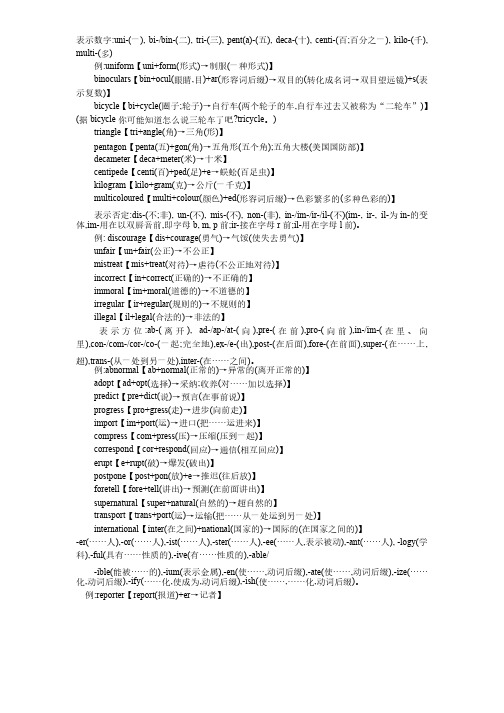
表示数字:uni-(一), bi-/bin-(二), tri-(三), pent(a)-(五), deca-(十), centi-(百;百分之一), kilo-(千), multi-(多)例:uniform 【uni+form(形式)→制服(一种形式)】binoculars 【bin+ocul(眼睛,目)+ar(形容词后缀)→双目的(转化成名词→双目望远镜)+s(表示复数)】bicycle 【bi+cycle(圈子;轮子)→自行车(两个轮子的车,自行车过去又被称为“二轮车”)】(据bicycle 你可能知道怎么说三轮车了吧?tricycle 。
)triangle 【tri+angle(角)→三角(形)】pentagon 【penta(五)+gon(角)→五角形(五个角);五角大楼(美国国防部)】decameter 【deca+meter(米)→十米】→十米】centipede 【centi(百)+ped(足)+e →蜈蚣(百足虫)】kilogram 【kilo+gram(克)→公斤(一千克)】multicoloured 【multi+colour(颜色)+ed(形容词后缀)→色彩繁多的(多种色彩的)】 表示否定:dis-(不;非), un-(不), mis-(不), non-(非), in-/im-/ir-/il-(不)(im-, ir-, il-为in-的变体,im-用在以双唇音前,即字母b, m, p 前;ir-接在字母r 前;il-用在字母l 前)。
例: discourage 【dis+courage(勇气)→气馁(使失去勇气)】unfair 【un+fair(公正)→不公正】→不公正】mistreat 【mis+treat(对待)→虐待(不公正地对待)】incorrect 【in+correct(正确的)→不正确的】→不正确的】immoral 【im+moral(道德的)→不道德的】→不道德的】irregular 【ir+regular(规则的)→不规则的】→不规则的】illegal 【il+legal(合法的)→非法的】→非法的】表示方位:ab-(离开), ad-/ap-/at-(向),pre-(在前),pro-(向前),in-/im-(在里、向里),con-/com-/cor-/co-(一起;完全地),ex-/e-(出),post-(在后面),fore-(在前面),super-(在……上,超),trans-(从一处到另一处),inter-(在……之间)。
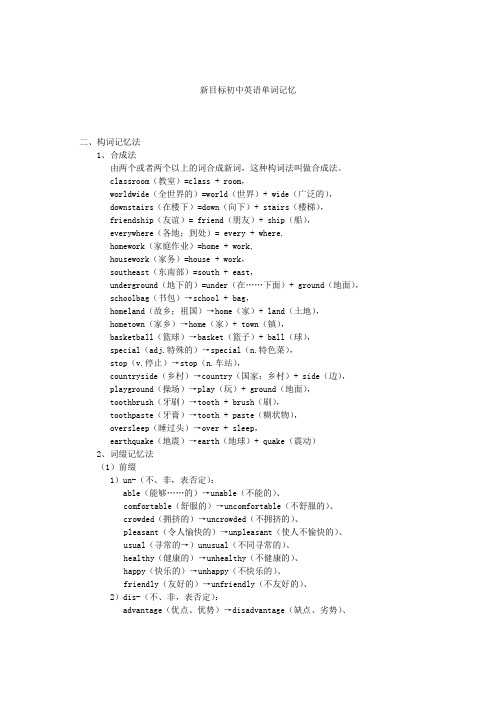
新目标初中英语单词记忆二、构词记忆法1、合成法由两个或者两个以上的词合成新词,这种构词法叫做合成法。
classroom(教室)=class + room,worldwide(全世界的)=world(世界)+ wide(广泛的),downstairs(在楼下)=down(向下)+ stairs(楼梯),friendship(友谊)= friend(朋友)+ ship(船),everywhere(各地;到处)= every + where.homework(家庭作业)=home + work,housework(家务)=house + work,southeast(东南部)=south + east,underground(地下的)=under(在……下面)+ ground(地面), schoolbag(书包)→school + bag,homeland(故乡;祖国)→home(家)+ land(土地),hometown(家乡)→home(家)+ town(镇),basketball(篮球)→basket(篮子)+ ball(球),special(adj.特殊的)→special(n.特色菜),stop(v.停止)→stop(n.车站),countryside(乡村)→country(国家;乡村)+ side(边),playground(操场)→play(玩)+ ground(地面),toothbrush(牙刷)→tooth + brush(刷),toothpaste(牙膏)→tooth + paste(糊状物),oversleep(睡过头)→over + sleep,earthquake(地震)→earth(地球)+ quake(震动)2、词缀记忆法(1)前缀1)un-(不、非,表否定):able(能够……的)→unable(不能的)、comfortable(舒服的)→uncomfortable(不舒服的)、crowded(拥挤的)→uncrowded(不拥挤的)、pleasant(令人愉快的)→unpleasant(使人不愉快的)、usual(寻常的→)unusual(不同寻常的)、healthy(健康的)→unhealthy(不健康的)、happy(快乐的)→unhappy(不快乐的)、friendly(友好的)→unfriendly(不友好的)、2)dis-(不、非,表否定):advantage(优点、优势)→disadvantage(缺点、劣势)、cover(覆盖)→discover(发现)、agree(同意)→disagree(不同意)、like→dislike(不喜欢)、honest(诚实的)→dishonest(不诚实的)、play(玩)→display(陈列)3)im-(不、非,表否定):polite(有礼貌的)→impolite(不礼貌的)、possible(可能的)→impossible(不可能的)4)re-(又、再、重新):review(复习)、return(归还)、rewrite(重写)、recycle(再循环;回收利用)5)inter-(相互、在一起):interview(面试)、international(国际的)、internet(因特网)6)en-(使)encourage(鼓励)、endanger(危及;使遭受危险)(2)后缀1)-or / -er(从事某职业的人或某类人):actor(演员)、visitor(参观者)、collector(搜集者)、translator(翻译家)、director(主任;主管)、singer(歌手)、teacher(老师)、reader(读者)、writer(作家)、foreigner(外国人)、learner(学习者)、villager(村民)、winner(胜利者)、foreigner(外国人)、owner(所有者;物主)、law(法律)→lawyer(律师)、、特例:post(邮寄;邮政)→poster(海报)、draw(画画)—drawer(抽屉)、elevate(提升)—elevator(电梯)、equal(平等的)—equator(赤道)、cook(煮)—cook(厨师)—cooker(厨具)、flower(花)、finger(手指)、slipper(拖鞋)、helicopter(直升机)、refrigerator(冰箱)、calculator(计算器)2)-ist(人,名词后缀):science(科学)→scientist(科学家)、art(艺术)→artist(艺术家)、tour(n.﹠v.旅行)→tourist(旅行者)、terrorist(恐怖分子)3)-tion(表示动作、状态,名词后缀):predict(v.预言)→prediction(n.预言)、compete(v.竞争)→competition(n.竞争)、invite(v.邀请)→invitation(n.邀请、请柬)、invent(v.发明)→invention(n.发明)instruct(v.指示)→instruction(n.指示;用法说明)attend(v.注意)→attention(n.注意、专心)、describe(v.描述)—description(n.描述)、attract(v.吸引)→attraction(n.有吸引力的事物或人)、pollute(v.污染)→pollution(n.污染)、donate(捐赠)→donation(捐赠物;捐款)、organize(组织)→organization(组织;机构)、pronounce(发音)→ pronunciation(发音(法))4)-ment(表示动作、状态,名词后缀):develop(v.发展)→development(n.发展)、advertise(v.登广告)→advertisement(n.广告)、entertain(v.款待;使娱乐)→entertainment(n.娱乐)、improve(v.改善)→improvement(n.改善)、argue(v.争论)→argument(n.争论)、state(v.陈述)→statement(n.陈述;声明)、require(v.要求)→requirement(n.要求)、government(政府)5)-ture / -ure(名词后缀)picture(图画)、temperature(温度)、future(将来)、structure(结构;构造)、creature(生物)、pressure(压力)、pleasure(愉快)6)-th(名词后缀)true(真实的)→truth(真相)、breath(n.呼吸)、birth(n.出生)7)-ful(充满,形容词后缀):success(成功)→successful(成功的)、wonder(奇迹)→wonderful(精彩的)、color→colorful(颜色鲜艳的、丰富多彩的)、beauty(美的东西)→beautiful(美丽的)、care→careful(仔细的、小心的)、peace→peaceful(平静的、和平的)、play→playful(顽皮的)8)-less(没有、无,形容词后缀):care→careless(粗心的)、help→helpless(无助的)、home→homeless(无家可归的)9)-y(表性质,形容词后缀):fun(乐趣)→funny(有趣的)、health(健康)→healthy(健康的)、sleep(睡觉)→sleepy((困倦的)、taste(味道;品尝)→tasty(味美可口的)、luck(运气)→lucky(幸运的)、shiny(有光泽的;发亮的)、sleepy(困倦的)、guilty(内疚的;有罪的)、salty(含盐的;咸的)特例:photography(摄影(业))、energy(活力;力量)10)-al(…的,形容词后缀):nature(大自然、天性)→natural(天然的、天生的、自然的)、nation(国家)→national(国际的)、person(个人)→personal(私人的、个人的)、medicine(药、医学)→medical(医学的)、normal(正常的)、final(最后的)11)-able(能够…的,形容词后缀):comfortable(舒服的)、knowledgeable(知识渊博的)、adjustable(可调整的)、suitable(合适的)12)-ous(形容词后缀)delicious(美味的)、nervous(紧张的)、enormous(巨大的)13)-ern(表…方向的):eastern(东方的)、western(西方的)、southern(南方的)、northern(北方的)14)-ly(形容词或副词后缀):作形容词后缀时:lovely(可爱的)、friendly(友好的)、lively(充满活力的)、daily(每日的;日常的)作副词后缀时:usually(通常)、simply(简单地)、probably(可能地)、really(真正地)、quickly(迅速地)、slowly(缓慢地)、certainly(当然)、clearly(清楚地;明显地)、extremely(极其;非常)、gradually(逐渐地)、strongly(坚定地)、exactly(正;恰恰)、normally(通常;正常地)15)-ed(形容词后缀):surprised(感到惊讶的)、interested(感兴趣的)、excited(感到兴奋的)、relaxed(轻松的)、worry(担心)→worried(烦恼的)、annoyed(恼怒的)、embarrassed(感到尴尬的)、organized(有组织的)、injured(受伤的)、tired(疲倦的)、spotted(有斑点的)、endangered(濒临灭绝的)、polluted(被污染的)16)-ing(形容词或名词后缀):形容词后缀:interesting(有趣的)、exciting(令人兴奋的)、outstanding(杰出的)、amazing(令人惊异的)、disappointing(令人失望的)、following(以下的)、willing(乐意的;心甘情愿的)、fascinating(迷人的)、frustrating(令人失望的)、embarrassing(令人尴尬的)、tiring(令人疲倦的)、confusing(令人困惑的)、convincing(令人信服的)、thrilling(令人激动的)、misleading(令人误解的;骗人的)名词后缀:building(建筑物)、training(训练)、meaning(意思)、ending(结局;结尾)附:国家、地区加后缀后表示“民族、语言或所属国家、地区(人或语言)的”China(中国)—Chinese中国人、汉语、中国(人)的Japan(日本)—Japanese日本人、日语、日本(人)的England(英国)—Englishman英国人、英国男人—Englishwoman英国女人—English英语(的),英国(人)的[the English][总称]英国人America(美国/洲)—American美国/洲人、美国(英)语、美国(人)的 Australia(澳大利亚、澳洲)—Australian澳大利亚人、澳大利亚(人)的 India(印度)—Indian印第安人、印第安语、印度的、印第安人的Russia(俄罗斯)—Russian俄国人、俄国的Canada(加拿大)—Canadian加拿大人、加拿大(人)的France(法国)—French法语(的)、法国(人)的[the French][总称]法国人—Frenchman法国男人—Frenchwoman法国女人Germany(德国)—German德语(的)、德国(人)的Asia(亚洲)—Asian亚洲人、亚洲(人)的Africa(非洲)—African非洲人、非洲(人)的Europe(欧洲)—European欧洲人、欧洲(人)的附录:一、不规则形容词副词比较级与最高级原级good/well better bestbad/badly worse worstill worse worstmany/much more mostlittle less leastfar farther farthestfurthest furthest二、不规则名词复数形式(1)单复数同形的名词Chinese—Chinese,Japanese—Japanese,deer—deer,sheep—sheep, fish—fish(2)单复数不同形的名词child—children,foot—feet,tooth—teeth,man—men,woman—women,German—Germans,mouse—mice附:以f(e)结尾的单词,一般变f为v,再加es或s 。

英语单词构词法(2)后缀1. 名词后缀(1) 具有某种职业或动作的人1)-an, -ain, 表示"……地方的人,精通……的人”American, historian,2)-al, 表示"具有……职务的人" principal,3)-ant,-ent, 表示"……者” merchant, agent, servant, student,4)-ar, 表示"……的人” scholar, liar, peddler5)-ard, -art, 表示"做……的人”coward, laggard, b raggart(夸张者)6)-arian, 表示"……派别的人,……主义的人”humanitarian, vegetarian7)-ary, 表示"从事……的人" secretary, missionary8)-ant, 表示"具有……职责的人" candidate, graduate9)-ator, 表示"做……的人" educator, speculator(投机者)10)-crat, 表示"某种政体,主义的支持者" democrat, bureaucrat11)-ee, 表示"动作承受者" employee, examinee12)-eer, 表示"从事于……人" engineer, volunteer13)-er, 表示"从事某种职业的人, 某地区,地方的人" banker, observer, Londoner, villager14)-ese, 表示" ……国人,…..地方的人”Japanese, Cantonese15)-ess, 表示"阴性人称名词,actress, hostess, manageress16)-eur, 表示"……家” amateur, littér ateur17)-ian, 表示"……地方人,信仰…….教的人,从事……职业的人”Christian, physician(内科医生),musician18)-ician, 表示"精通者,……家,”electrician, magician, technician19)-icist, 表示"……家,…….者, …….能手”physicist, phoneticist, technicist20)-ic, 表示"……者,……师" mechanic, critic21)-ie, 表示"爱,指小" dearie, auntie, lassie(小姑娘)22)-ier, 表示"从事……职业” cavalier, clothier, brazier(黄铜匠)23)-ine, ian, 表示"阴性人称" heroine, ballerina24)-ist, 表示"从事……研究者,信仰……主义者" pianist, communist, dentist, artist, chemist25)-ive, 表示"动作者,行为者” native, captive26)-logist, 表示"……学家,研究者" biologist, geologist(地质学家)27)-or, 表示"……者" author, doctor, operator,28)-ster, 表示"做…….事情的人”youngster, gamester(赌徒),songster29)-yer, 表示" 从事……职业者” lawyer(2). 构成,具有抽象名词的含义1)-acy, 表示"性质,状态,境遇" accuracy, diplomacy2)-age, 表示"状态,行为,身份及其结果,总称" courage, storage, marriage3)-al,? ???a) 表示"事物的动作,过程”refusal, arrival, survival, denial, approvalb) 表示具体的事物manual, signal, editorial, journal4)-ance, -ence表示"性质,状况,行为,过程,总量,程度” endurance, importance, diligence, difference, obedience5)-ancy, -ency, 表示"性质,状态,行为,过程" frequency, urgency, efficiency,6)-bility, 表示"动作,性质,状态" possibility, feasibility,7)-craft, 表示"工艺,技巧” woodcraft, handicraft, statecraft(治国策)8)-cracy, 表示"统治,支配" bureaucracy, democracy9)-cy, 表示"性质,状态,职位,级别" bankruptcy(破产),supremacy10)-dom, 表示"等级,领域,状态" freedom, kingdom, wisdom11)-ery, -ry, 表示"行为,状态,习性" bravery, bribery, rivalry12)-ety, 表示"性质,状态” variety, dubiety(怀疑)13)-faction, -facture, 表示"作成,……化,作用" satisfaction, manufacture14)-hood, 表示"资格,身份, 年纪,状态" childhood, manhood, falsehood15)-ice, 表示"行为,性质,状态" notice, justice, service16)-ine, 表示"带有抽象概念" medicine, discipline, famine17)-ing, 表示"动作的过程,结果" building, writing, learning18)-ion, -sion, -tion, -ation, -ition, 表示"行为的过程,结果,状况" action, solution, conclusion, destruction, expression, correction19)-ise, 表示"性质,状态” exercise, merchandise(商业)20)-ism, 表示"制度,主义,学说,信仰,行为" socialism, criticism, colloquialism, heroism21)-ity, 表示"性质,状态,程度” purity, reality, ability, calamity22)-ment, 表示"行为,状态,过程,手段及其结果treatment, movement, judgment, punishment, argument23)-mony, 表示"动作的结果,状态" ceremony, testimony24)-ness, 表示"性质,状态,程度" goodness, kindness, tiredness, friendliness25)-or, -our, 表示"动作,性质,状态" favor, error,26)-osity, 表示"动作,状态” curiosity27)-ship, 表示"情况,性质,技巧,技能及身份,职业” hardship, membership, friendship28)-th, 表示"动作,性质,过程,状态" depth, wealth, truth, length, growth29)-tude, 表示"性质,状态,程度" latitude, altitude(海拔)30)-ure, 表示"行为,结果" exposure, pressure, failure, procedure(手续),31)-y, 表示"行为的结果,状态,性质” glory, history, victory, inquiry(3) 带有场所,地方的含义1)-age, 表示"住所,地点" village, cottage2)-ary, 表示"住所,场地" library, granary (谷仓)3)-ery, ry, 表示"工作场所,饲养所,地点" laundry, nursery, surgery(手术室)4)-ory, 表示"工作场所,住处" factory, dormitory, laboratory, observatory(4) 带有学术,科技含义1)-grapy, 表示"……学,写法” biography, calligraphy, geography2)-ic, ics, 表示"……学……法" logic, mechanics, optics, electronics3)-ology, 表示"……学……论”biology, zoology, technology(工艺学)4)-nomy, 表示"……学……术" astronomy, economy, bionomy(生态学)5)-ery, 表示"学科,技术" chemistry, cookery, machinery6)-y, 表示"……学,术,法” photography, philosophy(5) 表示人和事物的总和,集合含义1)-age, baggage, tonnage2)-dom, newspaperdom(新闻界)3)-hood, neighbourhood, womanhood4)-ery, cavalry, ministry(内阁)5)-ure, legislature, judicature(6) 表示物品和物质名称的含义1)-ant, ent, solvent, constant2)-al, signal, pictorial(画报)3)ar, collar, pillar(石柱)4)- er, boiler, computer, washer, cooker5)-ery, drapery(绸缎)6)-ing, clothing, matting,7)-ment, instrument, equipment, attachment(7) 表示“细小”的含义1)-cle, particle,2)-cule, molecule(分子)3)-el, parcel4)-en, chicken, maiden5)-et, pocket, ticket6)-etta, -ette, etto, cigarette, essayette(短文)7)-kin, napkin8)-ling, duckling,9)-let, booklet10)-y, baby, doggy2. 形容词后缀(1)带有“属性,倾向,相关”的含义1)-able, -ible, movable, comfortable, applicable, visible, responsible2)-al, natural, additional, educational3)-an, ane, urban, suburban, republican4)-ant, -ent, distant, important, excellent5)-ar, similar, popular, regular6)-ary, military, voluntary7)-ice, -atie, ical, politic, systematic, historic, physical,8)-ine, masculine, feminine, marine9)-ing, moving, touching, daring10)-ish, foolish, bookish, selfish11)-ive, active, impressive, decisive12)-ory, satisfactory, compulsory13)-il, -ile, -eel, fragile, genteel(文雅的)(2) 表示“相象,类似”的含义1)-ish, boyish, childish2)-esque, picturesque3)-like, manlike, childlike4)-ly, manly, fatherly, scholarly, motherly5)-some, troublesome, handsome6)-y, milky, pasty(3) 表示“充分的”含义1)-ful, beautiful, wonderful, helpful, truthful2)-ous, dangerous, generous, courageous, various3)-ent, violent,(4) 表示由某种物质形成,制成或生产的含义1)-en, wooden, golden, woolen2)-ous, gaseous3)-fic, scientific(5) 表示方向的含义1)-ern, eastern, western2)-ward, downward, forward(6) 表示“倍数”的含义1)-ble, double, treble2)ple, triple3)-fold, twofold, tenfold(7) 表示“数量关系”的含义1)-teen, thirteen2)-ty, fifty3)-th, fourth, fiftieth(8) 表示国籍,语种,宗教的含义1)-an, Roman, European2)-ese, Chinese,3)-ish, English, Spanish(9) 表示“比较程度”的含义1)-er, greater2)-ish, reddish, yellowish3)-est, highest4)-most, foremost, topmost(10)其他的含义-less, 表示否定,countless, stainless, wireless3. 动词后缀1)-ize, ise, 表示"做成,变成,……化“modernize, mechanize, democratize, organize2)-en, 表示"使成为,引起,使有” quicken, weaken, soften, harden3)-fy, 表示"使……化, 使成”beautify, purify, intensify, signify, simplify4)-ish, 表示"使,令” finish, abolish, diminish, establish5)-ate, 表示“成为……,处理,作用” separat e, operate, indicate4. 副词后缀1)-ly, possibly, swiftly, simply2)-ward, -wards, downward, inwards, upward3)-ways, always, sideways4)-wise, otherwise, clockwise。
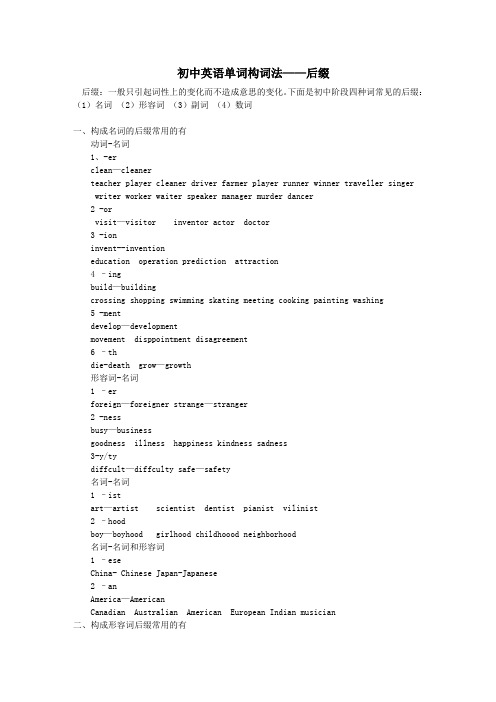
初中英语单词构词法——后缀后缀:一般只引起词性上的变化而不造成意思的变化。
下面是初中阶段四种词常见的后缀:(1)名词(2)形容词(3)副词(4)数词一、构成名词的后缀常用的有动词-名词1、-erclean—cleanerteacher player cleaner driver farmer player runner winner traveller singer writer worker waiter speaker manager murder dancer2 -orvisit—visitor inventor actor doctor3 -ioninvent--inventioneducation operation prediction attraction4 –ingbuild—buildingcrossing shopping swimming skating meeting cooking painting washing5 -mentdevelop—developmentmovement disppointment disagreement6 –thdie-death grow—growth形容词-名词1 –erforeign—foreigner strange—stranger2 -nessbusy—businessgoodness illness happiness kindness sadness3-y/tydiffcult—diffculty safe—safety名词-名词1 –istart—artist scientist dentist pianist vilinist2 –hoodboy—boyhood girlhood childhoood neighborhood名词-名词和形容词1 –eseChina- Chinese Japan-Japanese2 –anAmerica—AmericanCanadian Australian American European Indian musician二、构成形容词后缀常用的有名词-形容词-fulhelp-helpful careful useful forgetful wonderful beautiful-lesshope—hopeless careless homeless rainless-ycloud—cloudy windy lucky noisy funny rainy healthy-lyfriend—friendly day—daily love—lovely–alnature—natural personal traditional international-ousdanger-dangerous delicious serious mysterious-ernwest--western eastern northern southern动词--形容词-edclose—closed surprised balanced talend interested-inginterest--interestingoutstanding exciting following surprising-ableforget--forgetableacceptable laughable comfortable unforgettable enjoyable三、副词的后缀有形容词后加-lybad--badlyquickly usually strongly carefully luckily truly angrily clearly slowly quietly politely四、数词加后缀的变化three-thirteen-thirty third-thirteenth-thirtiethfour-fourteen-fourty fourth-fourteenth-fourtiethfive-fifteen-fifty fifth-fifteenth-fiftiethsix-sixteen-sixty sisth-sixteenth-sixtiethseven-seventeen-seventy seventh-seventeenth-seventietheight-eighteen-eighty eighth-eighteenth-eightiethnine-nineteen-ninety nineth-nineteenth-ninetieth。
初中英语单词构词法——后缀
后缀:一般只引起词性上的变化而不造成意思的变化。
下面是初中阶段四种词常见的后缀:(1)名词(2)形容词(3)副词(4)数词
一、构成名词的后缀常用的有
动词-名词
1、-er
clean—cleaner
teacher player cleaner driver farmer player runner winner traveller singer writer worker waiter speaker manager murder dancer
2 -or
visit—visitor inventor actor doctor
3 -ion
invent--invention
education operation prediction attraction
4 –ing
build—building
crossing shopping swimming skating meeting cooking painting washing
5 -ment
develop—development
movement disppointment disagreement
6 –th
die-death grow—growth
形容词-名词
1 –er
foreign—foreigner strange—stranger
2 -ness
busy—business
goodness illness happiness kindness sadness
3-y/ty
diffcult—diffculty safe—safety
名词-名词
1 –ist
art—artist scientist dentist pianist vilinist
2 –hood
boy—boyhood girlhood childhoood neighborhood
名词-名词和形容词
1 –ese
China- Chinese Japan-Japanese
2 –an
America—American
Canadian Australian American European Indian musician
二、构成形容词后缀常用的有
名词-形容词
-ful
help-helpful careful useful forgetful wonderful beautiful
-less
hope—hopeless careless homeless rainless
-y
cloud—cloudy windy lucky noisy funny rainy healthy
-ly
friend—friendly day—daily love—lovely
–al
nature—natural personal traditional international
-ous
danger-dangerous delicious serious mysterious
-ern
west--western eastern northern southern
动词--形容词
-ed
close—closed surprised balanced talend interested
-ing
interest--interesting
outstanding exciting following surprising
-able
forget--forgetable
acceptable laughable comfortable unforgettable enjoyable
三、副词的后缀有形容词后加-ly
bad--badly
quickly usually strongly carefully luckily truly angrily clearly slowly quietly politely
四、数词加后缀的变化
three-thirteen-thirty third-thirteenth-thirtieth
four-fourteen-fourty fourth-fourteenth-fourtieth
five-fifteen-fifty fifth-fifteenth-fiftieth
six-sixteen-sixty sisth-sixteenth-sixtieth
seven-seventeen-seventy seventh-seventeenth-seventieth
eight-eighteen-eighty eighth-eighteenth-eightieth
nine-nineteen-ninety nineth-nineteenth-ninetieth。